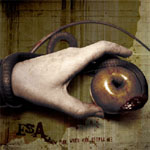
CD, Hive Records, 2008
www.electronicsubstanceabuse.com
The sophomore release of British musician Jamie Blacker’s solo project, ESA (Electronic Substance Abuse), shows that the positive critical reactions his debut offering were quite deserved and that the artist was still capable of improving the quality and creativity of his work. In a genre that is on the verge of becoming saturated, ESA has been gaining some well-deserved recognition by producing work that, though not flawless, stands well from the crowd and is sure to be remembered.
Less straightforward and in some stylistic aspects unexpectedly more subtle than the preceding album, in “How Pure Would Your Utopia Be?” ESA once more explores religious themes and their relation with the human condition – in particular in the darker corners of the mind. Not forgetting that part of the album is aimed at making people move on the dancefloor, a situation where any metaphorical subtleties are bound to be lost on the audience, ESA’s personal approach nevertheless skilfully eschews the obvious and the bombastic, instead leaving space for the listener to assemble the pieces of the aural puzzle and fill in the gaps with his own interpretation of the metaphors presented herein. With an overall epic feeling to it, there is also room for contrasting melancholy, a melancholy that becomes all too obvious in later tracks and where the artist shows how he has matured artistically since the previous album. Perhaps the true strength of “How Pure Would Your Utopia Be?” lies not so much in the more intensely rhythmic tracks (that roughly concentrate in the first part of the album) but rather in the calmer tracks, tracks that could be almost said to be laidback, if it wasn’t for the omnipresent feeling of underlying tension and, in a few tracks, hints of resignation.
While not afraid to make ample use of the tried-and-true ‘bag of tricks’ that made “Devotion, Denial, and Discipline” such an effective work (building layered crescendos, pauses and sudden rhythmic twists), ESA was not afraid to experiment with and incorporate a few new concepts and influences – which range from elements of tribal and ritual music to what are downright corruptions of party music – all to good effect. Perhaps the most unexpected track (and it did catch me totally unprepared) in this album is “Absolute Utero”, in which the abovementioned influences converge and which comes across as the dark party track par excellence (and by ‘dark’ I mean it in the dictionary sense of the word). Vocal contributions by other artists further enrich ESA’s music in this album, in particular the expressive vocal prestation of Nikki Telladictorian (of Prometheus Burning fame), in “Principals Of A Paradisic Resolve”, which adds significant depth and feeling to what is already a rather intense track and, after listening to the spoken word opening track, one can’t help but feel that perhaps ESA should try doing vocals in a few more of his own tracks (“Randomly Selected Drawbacks Of The Human Condition” comes across as a prime candidate for this treatment).
If there’s one thing in this album that I’m at odds with, it is the video track “Principals Of A Paradisic Resolve”. Though well aware of the non-budget that underground artists have to work with, I can’t shake the feeling that it comes across as somewhat contrived. Not so much the ritual-killer theme which has been done to death, but the image quality – having been shot directly on video, the clip’s image is too pristine, making it all too real and sordid. Though, perhaps that was the intention, to contrast the epic music with the objective and unglamourous realities of the physical world.
[8/10]
— Miguel de Sousa
